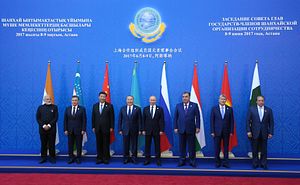For the first time since its 2001 inception, the Shanghai Cooperation Organization (SCO) suddenly has a pair of new members. As expected, last week’s SCO summit in Astana carried a bit more weight than high-level SCO meetings prior, with India and Pakistan officially added to the membership ranks. The expansion means that last week’s summit saw far more reverberation than any SCO development since at least 2005, when the organization issued a statement demanding the closure of non-SCO military bases in the region.
By simultaneously adding Pakistan and India the SCO, as participants emphasized last week, now represents nearly half of the global population, as well as significant economic and geographic heft. Moreover, where post-Soviet groups like the CSTO, CIS, or Eurasian Economic Union have floundered and flailed in struggling for relevance over the past few decade, the SCO — as evidenced by the expansion — continues to carry at least some muster among member-states, both current and prospective.
Still, despite the expansion, there wasn’t much at the summit to tamp down concerns about the group’s lack of cohesion. (Nor was there much attention to the summit in the first place; contra a Kazakhstani government mouthpiece, the elevation of India and Pakistan to full SCO membership resulted in very little media coverage.) As Crossroads Asia detailed earlier, the concomitant inclusion of both India and Pakistan is likely to only gum the gears of SCO collaboration, either economic or security. While much of the summit’s rhetoric focused on terrorism, the likelihood of increased collaboration between Delhi and Islamabad, via the SCO’s auspices, appears negligible — even if Russian President Vladimir Putin did take the summit as a chance to claim that the Islamic State “has been making new plans to destabilize Central Asia and southern Russia.”
Elsewhere, India’s outstanding concerns about Chinese economic hegemony are already well-known, especially as it pertains to Beijing’s investments through Kashmir. As Dawn detailed in its description of the summit, “India has also remained incensed that the [China-Pakistan Economic Corridor] ─ one of the key [One Belt, One Road] projects ─ passes through Kashmir and Pakistan, claiming that it is a violation of India’s territorial integrity.” Given that one of the SCO’s primary areas of focus remains, nominally, the combating of “separatism,” adding Kashmir to the SCO’s writ can only undercut the group’s stated aims that much further. (Unsurprisingly, the SCO summit saw little discussion of tamping down on “separatism” — perhaps understandable, given Russia’s support for separatist conflicts in both Ukraine and Georgia.)
To be sure, Indian Prime Minister Narendra Modi and Pakistani Prime Minister Nawaz Sharif took the summit as a chance to praise the SCO. Sharif said that the SCO is a “sheet anchor” regarding regional stability, one “destined to become a cornerstone of global politics and economics.” Given that the SCO now encompasses Crimea, Kashmir, and the South China Sea, the likelihood of ongoing stability within SCO member-states is perhaps less than Sharif assumed. Still, for the time being, Sharif and Modi seem eager to play up their participation in the SCO, as do actors in Moscow and Beijing who, along with their attendant propaganda outlets, hope to position the SCO as an organization demanding that much more attention.
But Modi, Sharif, and their SCO peers will need to prove that expansion does not result in a parallel slowdown in efficiency, and does not result in undermining any on-the-ground effects SCO membership may bring. And if they can’t, there’s little reason to think that any future expansion — say, via the Russia-backed push to include Iran — will make a difference otherwise.

































